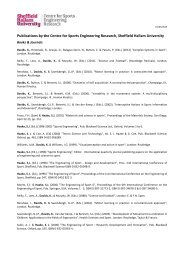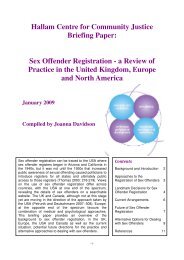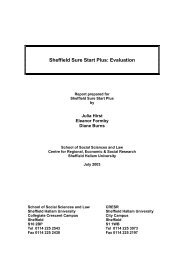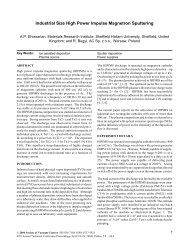The exercise of judicial discretion in rent arrears cases - Sheffield ...
The exercise of judicial discretion in rent arrears cases - Sheffield ...
The exercise of judicial discretion in rent arrears cases - Sheffield ...
You also want an ePaper? Increase the reach of your titles
YUMPU automatically turns print PDFs into web optimized ePapers that Google loves.
<strong>The</strong> quantitative data from the four courts does seem to bear out the importance <strong>of</strong> tenant<br />
participation <strong>in</strong> possession hear<strong>in</strong>gs. In London court, with the highest participation rate,<br />
there was a higher proportion <strong>of</strong> requests for adjournments, and <strong>of</strong> adjournments as the<br />
outcome <strong>of</strong> <strong>in</strong>itial hear<strong>in</strong>gs. Northern 2 court, with the lowest proportion <strong>of</strong> representation,<br />
had both the lowest proportion <strong>of</strong> adjournments requested and granted, and the highest<br />
proportion <strong>of</strong> possession orders (outright and suspended) requested and granted <strong>in</strong> all the<br />
four courts. <strong>The</strong> impact <strong>of</strong> hous<strong>in</strong>g benefit, as stated above, should also be taken <strong>in</strong>to<br />
account here. <strong>The</strong> reasons why ‘the physical reality’ <strong>of</strong> the tenant’s presence might be so<br />
important are discussed further <strong>in</strong> Chapter 6, below.<br />
Type <strong>of</strong> landlord<br />
Local authorities tend to be repeat players (for the effect <strong>of</strong> this, see Galanter (1974) and<br />
further discussion <strong>in</strong> Chapter 5), with their representatives attend<strong>in</strong>g the same court week<br />
after week, while a hous<strong>in</strong>g association might have very few <strong>cases</strong> <strong>in</strong> any particular court<br />
over the course <strong>of</strong> a year. This could have an effect both on the expertise <strong>of</strong> the landlord’s<br />
representative, and also on the trust placed <strong>in</strong> them by the district judge. This is illustrated<br />
by the follow<strong>in</strong>g comment:<br />
“Others are more amateur, and sort <strong>of</strong> obviously perhaps don’t come to court as<br />
much or, to give them the benefit <strong>of</strong> the doubt, they perhaps go to quite a number <strong>of</strong><br />
diffe<strong>rent</strong> courts and get diffe<strong>rent</strong> expectations, so they’re a bit confused about what<br />
anyone might want. I mean it’s obviously an advantage for people <strong>in</strong> that situation to<br />
be com<strong>in</strong>g to the same court all the time. <strong>The</strong>y really do get used to what we want.”<br />
(DJ F)<br />
<strong>The</strong> most strik<strong>in</strong>g example <strong>of</strong> a close relationship with a repeat player was at Northern 2<br />
court, where an established practice had been developed with the local authority landlord (it<br />
was noticeable that this practice did not apply to other social landlords br<strong>in</strong>g<strong>in</strong>g <strong>cases</strong> to this<br />
court). In Northern 2 the tenant and the local authority (the largest social landlord <strong>in</strong> the<br />
jurisdiction) will agree the outcome <strong>of</strong> the case by meet<strong>in</strong>g <strong>in</strong> the court build<strong>in</strong>g before the<br />
case is called <strong>in</strong> to the judge's chambers:<br />
“<strong>The</strong> arrangement here is that the hous<strong>in</strong>g <strong>of</strong>ficers sees the tenants outside first [...]<br />
and will reach an arrangement with them. [...] on a standard local authority, local<br />
authority <strong>rent</strong> possession list, it would be exceptional to see a tenant.” (DJ Y)<br />
This convention adopted for deal<strong>in</strong>g with claims by the major social landlord was described<br />
<strong>in</strong> very positive terms:<br />
“<strong>The</strong> reason we can get through a very heavy list is that they go and talk to everyone<br />
who's here and I would have said <strong>in</strong> 80% or 90% <strong>of</strong> <strong>cases</strong> they'll come <strong>in</strong> say<strong>in</strong>g,<br />
'we've talked to so-and-so and she's agreed to pay this, and we're happy to have a<br />
suspended order on that basis.' So there are very few really, where you end up with<br />
the tenant com<strong>in</strong>g <strong>in</strong>.” (DJ F)<br />
25
















